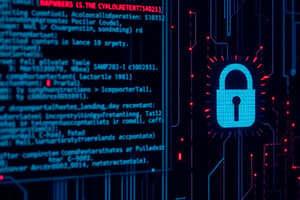Podcast
Questions and Answers
What does ransomware primarily do to a victim's files?
What does ransomware primarily do to a victim's files?
- Encrypts the files and demands ransom for recovery. (correct)
- Disguises itself as legitimate software.
- Replicates itself to spread to other systems.
- Monitors user activity for sensitive information.
How do worms differ from viruses?
How do worms differ from viruses?
- Worms require user intervention to spread.
- Worms disguise themselves as legitimate software.
- Worms exploit network vulnerabilities without user action. (correct)
- Worms attach to executable files.
Which type of malware is designed to provide remote access while hiding its presence?
Which type of malware is designed to provide remote access while hiding its presence?
- Spyware
- Rootkits (correct)
- Trojans
- Adware
What is the main function of keyloggers?
What is the main function of keyloggers?
What characteristic is unique to fileless malware?
What characteristic is unique to fileless malware?
Which of the following malware types is known for monitoring user activity without knowledge?
Which of the following malware types is known for monitoring user activity without knowledge?
What do botnets primarily consist of?
What do botnets primarily consist of?
Which type of malware automatically displays or downloads advertisements?
Which type of malware automatically displays or downloads advertisements?
Which statement about Trojans is true?
Which statement about Trojans is true?
Flashcards are hidden until you start studying
Study Notes
Ransomware
- Encrypts victim's files, rendering them inaccessible
- Demands payment (ransom) for decryption key
Worms vs. Viruses
- Worms spread independently, often through networks
- Viruses require user interaction to spread (e.g., opening infected files)
Remote Access Trojans (RATs)
- Provide remote access to attackers
- Conceal their presence to avoid detection
Keyloggers
- Record keystrokes, capturing sensitive information like passwords and credit card details
Fileless Malware
- Does not create or modify any files on the system
- Operates entirely within memory
Spyware
- Monitors user activity without their knowledge
- Collects sensitive data for malicious purposes
Botnets
- Networks of infected computers (bots)
- Controlled remotely for malicious activities
Adware
- Automatically displays or downloads unwanted advertisements
- Can slow down computer performance and lead to security risks
Trojan Horses
- Disguise themselves as legitimate software
- Contain malicious payloads that execute once installed
Studying That Suits You
Use AI to generate personalized quizzes and flashcards to suit your learning preferences.




